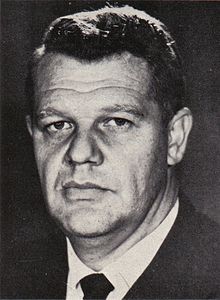
Pieter Willem Botha, was a South African politician. He served as the last prime minister of South Africa from 1978 to 1984 and the first executive state president of South Africa from 1984 to 1989.

Balthazar Johannes "B. J." Vorster was a South African apartheid politician who served as the prime minister of South Africa from 1966 to 1978 and the fourth state president of South Africa from 1978 to 1979. Known as B. J. Vorster during much of his career, he came to prefer the anglicized name John in the 1970s.
The Afrikaner Broederbond (AB) or simply the Broederbond was an exclusively Afrikaner Calvinist and male secret society in South Africa dedicated to the advancement of the Afrikaner people. It was founded by H. J. Klopper, H. W. van der Merwe, D. H. C. du Plessis and the Rev. Jozua Naudé in 1918 as Jong Zuid Afrika until 1920, when it was renamed the Broederbond. Its influence within South African political and social life came to a climax with the 1948-1994 rule of the white supremacist National Party and its policy of apartheid, which was largely developed and implemented by Broederbond members. Between 1948 and 1994, many prominent figures of Afrikaner political, cultural, and religious life, including every leader of the South African government, were members of the Afrikaner Broederbond.

Marais Viljoen, was the last ceremonial State President of South Africa from 4 June 1979 until 3 September 1984. Viljoen became the last of the ceremonial presidents of South Africa when he was succeeded in 1984 by Prime Minister P. W. Botha, who combined the offices into an executive state presidency.

Roelof Frederik "Pik" Botha, was a South African politician who served as the country's foreign minister in the last years of the apartheid era, the longest-serving in South African history. Known as a liberal within the party, Botha served to present a friendly, conciliatory face on the regime, while criticised internally. He was a leading contender for the leadership of the National Party upon John Vorster's resignation in 1978, but was ultimately not chosen. Staying in the government after the first non-racial general election in 1994, he served under Mandela as Minister of Mineral and Energy Affairs from 1994 to 1996.
The Citizen is a South African daily newspaper published in Johannesburg, South Africa. The newspaper is distributed nationally in South Africa. It has long been considered a newspaper of record in South Africa. While its core readership is mainly in Gauteng, it also distributes to surrounding provinces such as Free State, Northern Cape, Mpumalanga, Limpopo and the North West. The newspaper is owned by Caxton and CTP Publishers and Printers Limited, a public company listed on the JSE.
The Cabinet of South Africa is the most senior level of the executive branch of the Government of South Africa. It is made up of the president, the deputy president, and the ministers.

Cornelius Petrus Mulder was a South African politician and cabinet minister.
The Bureau for State Security was the main South African state intelligence agency from 1969 to 1980. A high-budget and secretive institution, it reported directly to the Prime Minister on its broad national security mandate. Under this mandate, it was at the centre of the Apartheid state's domestic intelligence and foreign intelligence activities, including counterinsurgency efforts both inside South Africa and in neighbouring countries. Like other appendages of the Apartheid security forces, it has been implicated in human rights violations, political repression, and extra-judicial killings.
Eschel Mostert Rhoodie was a South African civil servant, public relations officer and spin doctor most famous as being one of the key players in the 1978–79 Information Scandal, also known as "Infogate" or "Muldergate". He served as the Secretary of the Department of Information between 1972 and 1977, while Connie Mulder was Minister of the department.
Robert van Schalkwyk Smit (1933–1977) was an economist and parliamentary candidate for South Africa's National Party, tipped as a future Minister of Finance. He was murdered, along with his wife Jean-Cora, on 22 November 1977. No arrests have ever been made, and there was little evidence in the case, but the murders are widely suspected to have been politically motivated. Cabinet Minister Pik Botha described it as "one of the most haunting criminal mysteries in our country," and the police investigation remained open as of November 2012.

During the 1950s and 1960s, Israel became an open critic of the apartheid regime in South Africa, hoping to establish good relations with black-majority countries in Africa. However, most African countries severed ties with Israel in 1973 due to economic threats by oil-rich countries in the Arab world. This situation led Israel to deepen its diplomatic ties with South Africa throughout the 1970s and 1980s.
Louis Luyt was a South African business tycoon and politician, and one-time rugby administrator.
The State Security Council (SSC) was formed in South Africa in 1972 to advise the government on the country's national policy and strategy concerning security, its implementation and determining security priorities. Its role changed through the prime ministerships of John Vorster and PW Botha, being little used during the former's and during the latter's, controlling all aspects of South African public's lives by becoming the Cabinet. During those years he would implement a Total National Strategy, Total Counter-revolutionary Strategy and finally in the mid-eighties, established the National Security Management System (NSMS). After FW de Klerk's rise to the role of State President, the Cabinet would eventually regain control of the management of the country. After the 1994 elections a committee called National Intelligence Co-ordinating Committee was formed to advise the South African president on security and intelligence as well as its implementation.
The National Intelligence Service (NIS) is a defunct intelligence agency of the Republic of South Africa that replaced the older Bureau of State Security (BOSS) in 1980. Associated with the Apartheid era in South Africa, it was replaced on 1 January 1995 by the South African Secret Service and the National Intelligence Agency with the passage of the Intelligence Act (1994).
General Hendrik Johan van den Bergh, SSA was a South African police official most famous for founding the Bureau of State Security (B.O.S.S.), an intelligence agency created on 16 May 1969 to coordinate military and domestic intelligence for the government as well as to suppress political dissidents. He was known as "Tall Hendrik" on account of his height.

Golden Rendezvous is a 1977 South African action thriller film directed by Ashley Lazarus and starring Richard Harris, Ann Turkel and David Janssen. It was based on the 1962 novel The Golden Rendezvous by Alistair MacLean.
The South African Party was a small political party in South Africa from 1977 to 1980.
Ernest Leonard Bulle was an academic and politician who served as a minister in the governments of Rhodesia and Zimbabwe Rhodesia. He served in the cabinet of Rhodesia as joint Minister of Finance and Minister of Commerce and Industry alongside David Smith from 1978 to 1979 as part of the country's Internal Settlement. He continued as commerce minister in the government of Zimbabwe Rhodesia between June and December 1979. First elected to parliament in the 1979 Zimbabwe Rhodesia general election, he stood unsuccessfully in the 1980 general election, which set the membership of the first parliament of the independent Zimbabwe. Bulle was a member of the United African National Council and served as the party's second vice-president.

The Security Branch of the South African Police, established in 1947 as the Special Branch, was the security police apparatus of the apartheid state in South Africa. From the 1960s to the 1980s, it was one of the three main state entities responsible for intelligence gathering, the others being the Bureau for State Security and the Military Intelligence division of the South African Defence Force. In 1987, at its peak, the Security Branch accounted for only thirteen percent of police personnel, but it wielded great influence as the "elite" service of the police.










